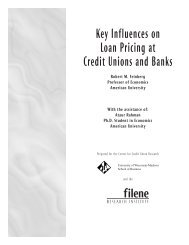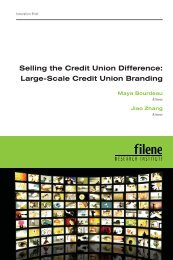Credit Union and Cooperative Patronage Refunds - Filene ...
Credit Union and Cooperative Patronage Refunds - Filene ...
Credit Union and Cooperative Patronage Refunds - Filene ...
You also want an ePaper? Increase the reach of your titles
YUMPU automatically turns print PDFs into web optimized ePapers that Google loves.
Endnotes<br />
1. Based on call reports from the NCUA website for the years<br />
2008, 2009, <strong>and</strong> 2010.<br />
2. Nonrecurring tax- deductible rebates are allowed only in the tax<br />
year that the rebate is paid. Recurring rebates are deductible in<br />
the year that the liability is fixed <strong>and</strong> determinable. Regs. Secs.<br />
1.461-5(b)(1)(ii), (b)(1)(iii), <strong>and</strong> (b)(3).<br />
3. A point that should please capitalists <strong>and</strong> socialists alike but not<br />
communists.<br />
4. Obviously, to attract capital, the cooperative must pay a reasonable<br />
rate of return to third parties for the use of equity as in<br />
preferred stock or debt as in subordinated debentures.<br />
5. This is a point of disagreement with several academics in the<br />
co-op community with whom we are familiar. It’s not clear to<br />
us exactly why these academics resist the idea that a co-op’s<br />
financial metrics may not reasonably allow it to allocate all<br />
patronage earnings <strong>and</strong> redeem all the allocated equity while<br />
it is simultaneously maintaining, building, <strong>and</strong> capitalizing its<br />
business. Our sense is that it conflicts so violently with their<br />
progressive point of view. One cannot help conclude that these<br />
academics would argue that if a co-op allocates the income,<br />
then surely it can redeem the equity. We know of nothing in a<br />
co-op’s DNA that allows that indulgence.<br />
6. In co-op tax-speak, apportionment is different from allocation.<br />
Apportionment is to assign earnings <strong>and</strong> equity to members on<br />
the co-op’s books without notification to the member. Allocation<br />
is apportionment plus notification to the member, <strong>and</strong><br />
under Subchapter T, allocation also carries with it the vesting<br />
of the equity in each member to whom patronage earnings are<br />
distributed with allocated equity.<br />
7. Revenue Revisions, 1947–1948: Hearings Before the Comm. on<br />
Ways <strong>and</strong> Means, 80th Cong., pt. 4, at 3136 (1948).<br />
8. Some bylaws call for the distribution of all or part of the<br />
remaining proceeds to nonprofit or tax- exempt organizations<br />
as a way of honoring a commitment to the cooperative form of<br />
business organization.<br />
9. Co-ops are democratically controlled on a one member–one<br />
vote basis. Older members have bigger voices because they are<br />
respected, <strong>and</strong> they are respected if they have lots of allocated<br />
equity because they have loyally supported the co-op over the<br />
years.<br />
10. Financial firms in the S&P 500 paid an annual dividend of<br />
1.1% of capital in 2010 <strong>and</strong> 1.4% through March 31, 2011. In<br />
65








